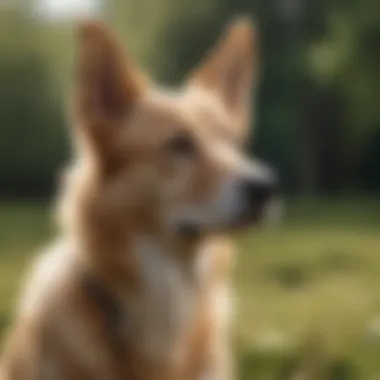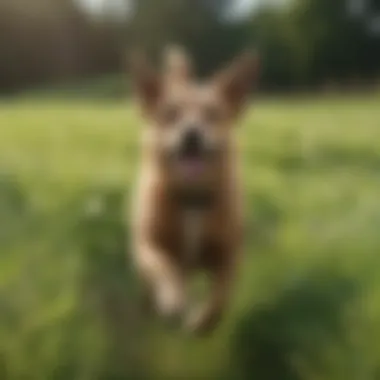Discovering Gaelic Names for Dogs: A Unique Guide


Intro
Choosing a name for a dog can be a deeply personal decision for pet owners. The name reflects not just the dog's identity, but also the owner's preferences and cultural influences. Gaelic names offer a unique blend of historical significance, meaning, and beauty. This article aims to explore Gaelic names for dogs, examining their origins and meanings while providing guidance on how to select the perfect name that resonates both with the owner and their canine companion.
Aspects covered will include the linguistic roots of these names, the cultural significance tied to them, and practical considerations to keep in mind when naming a pet. In addition, we will investigate some popular Gaelic names along with suggestions on how to choose a name that best fits the characteristics and personality of the dog. Readers will come away not just with potential names, but with a deeper appreciation for the rich tapestry of Gaelic language and culture as it pertains to the world of pets.
Pet Care and Grooming
The significance of maintaining proper care for a dog goes beyond simple hygiene. It plays a crucial role in their overall health and well-being. Regular care can improve the bond between dogs and their owners while ensuring the dog remains comfortable and content.
Importance of Regular Care
Regular grooming of dogs including brushing, bathing, and nail clipping can prevent various health issues. It helps in removing dirt, debris, and loose fur while also minimizing the risk of skin infections. Additionally, grooming can provide an opportunity to check for unusual lumps, bumps, or parasites.
Grooming Techniques by Pet Type
Different dog breeds may require diverse grooming techniques due to their varying coat types. For instance:
- Long-haired breeds like the Collie may require daily brushing to prevent tangles.
- Short-haired breeds, such as Beagles, can benefit from weekly grooming.
- Curly-haired breeds like Poodles necessitate regular clipping to avoid matting.
Tools and Products Recommendations
Investing in the right grooming tools can make the process easier and more effective. Some recommended tools include:
- Slicker brushes for detangling fur
- De-shedding tools for short-haired breeds
- Pet-safe shampoos for bathing
- Nail clippers suited for the size of the dog's paws
Seasonal Care Tips
Understanding seasonal changes is critical for effective pet care. During summer, ensure the dog is hydrated and avoid excessive heat exposure. In winter, consider protective gear like doggy jackets and booties to keep them warm. Being mindful of these seasonal aspects contributes significantly to your pet's comfort.
Regular grooming not only enhances the dog's appearance but also strengthens the relationship between pet and owner.
Health and Nutrition
To ensure a dog thrives, proper health and nutrition must be prioritized. Understanding what dogs need in terms of diet and health care has implications for their longevity and happiness.
Understanding Pet Nutrition
A balanced diet is foundational to a dog's overall health. Key components of a good diet include:
- High-quality protein sources for muscle development
- Healthy fats for energy
- Carbohydrates for energy and digestive health
Common Health Issues by Species
Various health issues may afflict different breeds. Some common problems include:
- Hip dysplasia in large breeds like German Shepherds
- Allergies in breeds such as Bulldogs
- Dental issues across many breeds
Preventive Care and Regular Check-Ups
Regular veterinary visits are essential. They allow for vaccinations, dental check-ups, and other preventive measures that ensure a dog's health. Setting a schedule for routine visits can make a big difference.
Food and Dietary Advice
When selecting dog food, consider:
- Individual dietary needs associated with age and breed.
- Any allergies or sensitivities the dog might have.
- Consultation with a veterinarian before making significant dietary changes.
Behavioral Training
Training your dog is as important as caring for its physical health. A well-behaved dog can make interactions more enjoyable and manageable.
Basics of Positive Reinforcement
Using positive reinforcement is an effective training method. This involves rewarding desired behaviors, which encourages dogs to repeat those behaviors.
Training Techniques Users Can Apply


Some training techniques that can be effective include:
- Clicker training for specific commands.
- Leash training to teach proper walking etiquette.
Managing Behavioral Issues
Understanding the root cause of behavioral issues is essential for effective management. For instance, excessive barking may stem from anxiety or boredom.
Importance of Socialization
Socialization plays a pivotal role in the development of well-rounded pets. Introducing dogs to various environments, people, and other animals from a young age can help reduce fear and anxiety.
Engaging Activities and Enrichment
Dogs require mental stimulation along with physical exercise. Engaging activities can prevent boredom and promote a healthy lifestyle.
Fun Games to Play with Your Pet
Activities like fetch, hide and seek, or tug of war can be enjoyable for both pets and owners. They help in providing physical exercise while also fostering emotional connections.
DIY Toys and Activities
Creating DIY toys using safe household materials can be an economical and fun way to keep a dog entertained. For example, old socks can be turned into tug toys.
Importance of Mental Stimulation
Incorporating puzzle toys or training sessions can offer mental challenges, which are important for a dog’s well-being.
Outdoor Adventures and Exploration
Regular adventure walks or trips to the dog park can invigorate a dog's spirits. Exploring different trails or natural settings provides both physical exercise and mental enrichment.
Resources and Community Engagement
Connecting with other dog owners or enthusiasts can provide valuable insights and support. There are numerous resources available for pet owners.
Recommended Books and Websites
Consider exploring websites like Wikipedia and Britannica that offer information on dog breeds and care.
Forums and Groups for Pet Owners
Platforms like Reddit have communities where pet owners can discuss various topics related to pet care and share experiences.
Finding Local Services and Classes
Look for nearby dog training classes or grooming services to enhance your experience with your pet.
Encouraging Community Sharing and Contributions
Engaging with local pet communities can enrich the experience for both the pets and their owners, opening doors to sharing knowledge and resources.
Prolusion to Gaelic Names for Dogs
The selection of a name for a dog is more than a simple task. It has layers of meaning and significance, especially when exploring Gaelic names. Gaelic names carry a rich heritage that reflects cultural roots and resonate with unique values and traits that dog owners hold dear. This article aims to journey through the diversity of Gaelic nomenclature, looking closely at what these names signify and how they can enhance the bond between you and your furry friend.
Understanding the Importance of Names
Names have profound psychological impacts. They shape our perceptions and can influence behavior. For dogs, their name becomes a part of their identity. When owners choose a name steeped in tradition and meaning, they often find a deeper connection to their pet. Gaelic names, in particular, carry stories, visions, and histories that resonate with several aspects of life. Each name reflects often values like loyalty, courage, and companionship.
The right name can aid in training. A distinctive name helps a dog differentiate between commands and everyday interactions. Names that are easy to pronounce or have a melodic sound may work better in training sessions, increasing overall communication between pet and owner.
An Overview of Gaelic Language and Culture
The Gaelic language is a branch of the Celtic languages, spoken primarily in Scotland and Ireland. It is not just a means of communication, but a symbolic link to a rich cultural tapestry that includes folklore, tradition, and music. The complexity and beauty of Gaelic enrich the names derived from it, providing a unique lens through which to understand and appreciate nature and the canine bond.
Gaelic names often embody physical characteristics, behaviors, or personality traits of animals. They are formed from nouns, adjectives, and sometimes verbs, which reflects a poetic elegance. This linguistic charm makes Gaelic names appealing. Additionally, these names carry a sense of history and identity that can deepen the owner's connection to their pet.


In summary, exploring Gaelic names for dogs is not merely about assigning a label. It is an exploration of cultural significance, personal identity, and the nature of companionship. Understanding this allows owners to appreciate the story behind the name they choose, enriching their relationship with their canine companion.
The Significance of Naming Pets
Naming a pet is more than a mere formality. It plays a crucial role in shaping the relationship between the animal and its owner. Choosing a name carries significance that can impact not only the dog's behavior but also the owner's connection to the pet. As we explore Gaelic names for dogs, it becomes clear that this practice embodies both tradition and personal sentiment. Understanding the impact of names helps pet owners appreciate the deeper purpose behind their choices.
Psychological Impacts of Names on Pets
Names can influence a pet's behavior. Research indicates that dogs respond better to shorter, distinct sounds. This could explain why many Gaelic names, which often have unique phonetic structures, are favored among dog owners. For example, names like Aisling (dream) and Fionn (white or fair) possess a distinctive quality that helps dogs recognize and respond effectively.
Additionally, a well-chosen name affects the bond between the owner and the pet. When a pet responds positively to its name, it reinforces the owner's authority and enhances communication. This connection brings a more fulfilling experience for both parties. Furthermore, understanding the meaning behind the name can deepen the emotional ties. Owners who choose Gaelic names often express their love for their heritage or culture, making the bond even more significant.
Cultural Reflections in Naming Practices
Naming conventions provide insight into cultural values and beliefs. Gaelic names reflect the history and traditions of the Irish and Scottish people. Often, these names carry meanings associated with nature, mythology, and personal attributes. For instance, Rónán, meaning ‘little seal’, connects to the natural world, while Aodh translates to ‘fire’, symbolizing warmth and strength.
The choice of a Gaelic name for a dog can represent a respect for heritage or an appreciation for the beauty of the language. It connects an individual to a broader culture. This practice is not only a personal choice but also a reflection of cultural identity. Pet owners might seek names that resonate with their own values, making this act of naming an enriching process. Ultimately, the significance of naming pets is multi-faceted, combining psychological impacts with cultural reflections that deepen relationships and foster understanding.
Common Gaelic Names for Dogs
Choosing a name for a dog can seem like a trivial task, but it’s important to consider the deeper implications of the name. Common Gaelic names for dogs not only reflect a rich cultural heritage but also imbue a sense of identity for the pet. Selecting a name from the Gaelic tradition can be an honor for both the owner and the animal. These names often carry significant meanings, which can contribute to the bond between the pet and its owner.
With Gaelic names, individuals can highlight their appreciation for the culture while selecting a name that resonates on a personal level. This connection can make the overall experience of pet ownership enriching. Understanding the specific meanings behind names and how they relate to a dog’s characteristics can streamline the process of selecting a suitable name.
Popular Gaelic Names and Their Meanings
Many popular Gaelic names for dogs possess unique meanings that can complement the animal's traits, bringing an extra layer of significance to the naming process. For instance, the name Dara, meaning “oak,” embodies strength and stability. This could be an apt choice for a robust breed like a German Shepherd.
Another excellent option is Saoirse, which translates to “freedom.” This name suits a spirited dog that loves to roam. Common names like Finn, meaning “fair” or “white,” offer versatility while retaining cultural weight.
Here’s a list of notable names and their meanings:
- Aisling: Dream or vision.
- Caoimhe: Gentle or beautiful.
- Liam: Resolute protector.
- Ronan: Little seal.
Selecting a name from this category allows for personal expression while enhancing a dog's identity.
Unique Gaelic Names for Different Breeds
Different dog breeds can inspire a range of Gaelic names that correspond with their physical and behavioral attributes. For instance, a playful breed such as a Border Collie may suit the name Brogan, which translates to “shoes” or “sandals,” representing a lively dynamic.
On the other hand, a dignified breed like a Great Dane may find a fitting name in Tadhg, which means “poet” or “philosopher,” reflecting the breed's elegant stature.
Some unique Gaelic names include:
- Sinead: A classical name, denoting grace, great for an agile breed.
- Niamh: Meaning bright or radiant, perfect for a dog with a lively personality.
- Eoghan: Signifying a young warrior, suitable for a strong and brave breed like a Rottweiler.
The choice of a specialized name allows for meaningful connections and personalized expressions that reflect the innate traits of individual breeds.
Choosing the Right Gaelic Name
Choosing the right Gaelic name for your dog is an important process that influences how both you and your pet will experience your time together. A name is not just a label; it serves as an identifier that carries emotional weight. For many dog owners, the goal is to establish a strong bond with their pet. A name with Gaelic roots can often encapsulate cultural significance, personal meaning, or even a specific attribute of the dog. In this section, we will explore key factors to consider during the naming process and provide tips to help you select a name that resonates well with both you and your furry companion.
Factors to Consider When Naming Your Dog
When deciding on a Gaelic name for your dog, several factors should be taken into account:
- Pronunciation: Gaelic names can sometimes be difficult to pronounce, especially for those who are not familiar with the language. Choosing a name that is easy to say can help in training and everyday communication.
- Meaning: Understanding the meaning behind a name can add depth to your choice. For instance, names like “Aisling” mean dream or vision, reflecting a special quality of your dog.
- Length and Simplicity: Shorter names, ideally one or two syllables, often work better than longer names. This simplicity helps the dog recognize its name quickly.
- Personality and Appearance: The name you choose can reflect your dog’s character or looks. For example, names such as “Bran,” which means raven, might suit a dark-furred dog.
- Cultural Relevance: Consider your own connection to Gaelic culture. If you have Irish or Scottish heritage, using a Gaelic name can reinforce your sense of identity.
Tips for Selecting a Name that Resonates
Choosing a name that truly resonates with you and your dog can enhance the owner-pet bond. Here are some tips to guide you:
- Try It Out: Say the name aloud. Try using it in conversations and see how it feels. Is it flowing or cumbersome? Do you like how it sounds?
- Visualize the Name: Think about how the name fits your dog. Visualize calling your pet and how likely it is to respond positively.
- Consult with Others: Engaging family or friends in the process can provide helpful feedback. They may offer insights or suggest names you hadn’t considered.
- Consider Nicknames: Many names naturally evolve into nicknames. Make sure you like any possible variations as well.
- Be Open to Change: If a name you thought was perfect no longer fits as your dog grows, don’t hesitate to reassess. Flexibility is key to feeling good about your choice.
A name is not just what someone calls a dog; it can influence the relationship shared between them.
In summary, selecting the right Gaelic name for your dog is an engaging experience that involves thoughtful consideration. By evaluating factors such as pronunciation, meaning, and cultural significance, you can arrive at a name that enriches both your lives. Taking the time to choose wisely will establish a foundation for a strong bond and mutual understanding.


Integrating Gaelic Names into Daily Life
Integrating Gaelic names into your daily interactions with your dog can enrich both the owner-pet relationship and the overall experience of pet ownership. Gaelic names are rooted in a culture and language that emphasize depth and meaning. When you use these names consistently in everyday situations, you help strengthen the bond between you and your dog. Furthermore, these names carry historical and personal significance, which can add layers of connection to your pet's identity.
Utilizing Gaelic names allows owners to revere cultural heritage. It invites discussions about the names' meanings or origin stories, fostering a sense of community with other dog owners. This also serves as a reminder of the importance of honoring one’s roots and the cultures we admire. Embracing these names in daily life is not just about choosing a pretty sound; it is about acknowledging the narrative behind each name.
Using Names in Training and Commands
Incorporating Gaelic names into training sessions can be quite beneficial. Dogs, like humans, respond better when they feel a connection to the name they are called. Using a Gaelic name consistently helps establish a form of recognition and respect. For instance, if you choose a name like Aisling, meaning
Exploring Variants of Gaelic Names
Exploring the variants of Gaelic names is essential in understanding their richness and diversity. Gaelic names are not static; they have evolved over time, reflecting cultural shifts and linguistic changes. This section will delve into the distinctions between traditional and modern Gaelic names, along with the regional differences in naming conventions. Each aspect plays a critical role in choosing the right name for a dog, enhancing its significance beyond mere label.
Traditional vs.
Modern Gaelic Names
Traditional Gaelic names often carry deep historic roots. They are imbued with meanings linked to nature, qualities, or characteristics relevant to the culture from which they originate. These names may be preferred by those desiring a connection to the heritage and history of Gaelic-speaking regions.
Examples of Traditional Gaelic Names include:
- Aisling (meaning “dream”)
- Caoimhe (meaning “gentleness”)
- Niamh (meaning “bright”)
Modern Gaelic names, on the other hand, tend to reflect contemporary trends and may incorporate influences from popular culture or new societal norms. While they can still have traditional meanings, modern names might be more appealing to a modern audience. Examples might include:
- Sióg (a spell of good luck)
- Rónán (meaning “little seal”)
The choice between traditional and modern can impact how a dog’s name is perceived. A traditional name may resonate with those who appreciate history, whereas a modern name might feel more approachable in today’s society.
Regional Differences in Gaelic Naming Conventions
Regional variations in Gaelic naming conventions showcase the geographical diversity within Gaelic culture. Names used in Scotland may differ in pronunciation and spelling from their Irish counterparts, despite having similar meanings. Local dialects and traditions shape how names are created and adopted.
For instance, in Ireland, the name Órlaith means
Resources for Further Exploration
Exploring Gaelic names for dogs opens a door to a rich tapestry of culture. The resources you choose can enhance your understanding and appreciation of these names. This section emphasizes the significance of having reliable resources at your fingertips, which not only aid in naming your dog but also connect you deeper with Gaelic culture.
Whether through literature or online platforms, having access to curated materials can help you make informed choices. Key benefits include understanding the meanings behind each name, learning about regional variations, and discovering how the name you choose reflects cultural heritage. It can also support your journey in selecting a name that truly resonates with both you and your pet.
Books and Online Platforms for Gaelic Names
Numerous books and online platforms provide valuable insights into Gaelic names for dogs. Consider the following elements when seeking resources:
- Books: There are several books dedicated to Gaelic language and culture. These texts often delve into the history and significance of names. Look for titles like "Scottish Gaelic for Dogs" or "The Gaelic Naming Book" for thorough exploration.
- Online Platforms: Websites such as Wikipedia offer entries on Gaelic names, while cultural forums and sites like Reddit can provide community insights. Search for dedicated Gaelic groups on Facebook for discussions and recommendations.
Using a mixture of these resources allows for a broader understanding of names. The Wikipedia entries are particularly useful for quick reference, while in-depth books provide context and detail.
Connecting with the Gaelic Culture
Engaging with the Gaelic culture can deepen the significance of the name you choose for your dog. Understanding its roots and traditions provides a sense of connection and respect for the heritage. Here are some aspects to consider:
- Local Events: Immersing yourself in local Gaelic or Celtic events can be invaluable. Attending festivals or community gatherings allows for direct engagement with the culture.
- Language Classes: If you are inclined, consider taking Gaelic language classes. This not only helps in pronouncing names correctly but also enriches your appreciation of Gaelic customs.
- Cultural Groups: Join cultural groups or associations that focus on Gaelic heritage. They often provide resources, workshops, and social gatherings that focus on the language and its significance.
Engaging with the culture fosters a sense of belonging and enhances your ability to differentiate the nuances in names. The more you learn about Gaelic heritage, the more meaning your dog's name can hold, making it more than just a label.
Learning about Gaelic names for dogs offers insights into a language that is rich with history. Understanding these names fosters a deeper bond between you and your pet, reflecting shared experiences and sentiments.
Culmination
In exploring Gaelic names for dogs, we uncover significant layers of meaning and connection that pet owners can share with their companions. The choice of a name is not merely a superficial exercise. It becomes a reflection of identity, culture, and personality.
Reflecting on the Journey of Naming Your Dog
Choosing a Gaelic name can be a rewarding journey. Each name carries its own story, rooted in the rich traditions of the Gaelic language. As you select a name, consider the history and meaning behind it. This process can deepen your emotional connection to your dog. The journey offers a chance for personal reflection, aligning the name with your dog's characteristics and your own values. A name like "Aisling," meaning dream or vision, may resonate with an owner who views their pet as a source of inspiration.
The Lasting Bond Beyond the Name
The name you choose for your dog is not just a label; it is a bond that continues to grow over time. Each time you call your dog, you reaffirm that connection. A Gaelic name adds a layer of cultural identity and personal significance, enhancing the relationship. This bond is not only about communication but also about shared experiences. It helps shape your dog’s identity in your household and community. As you form this connection, reflect on the importance of your dog’s name, recognizing that it carries with it a deeper meaning that endures throughout your lives together.
A name is a doorway to understanding and acceptance within the bonds of companionship.















